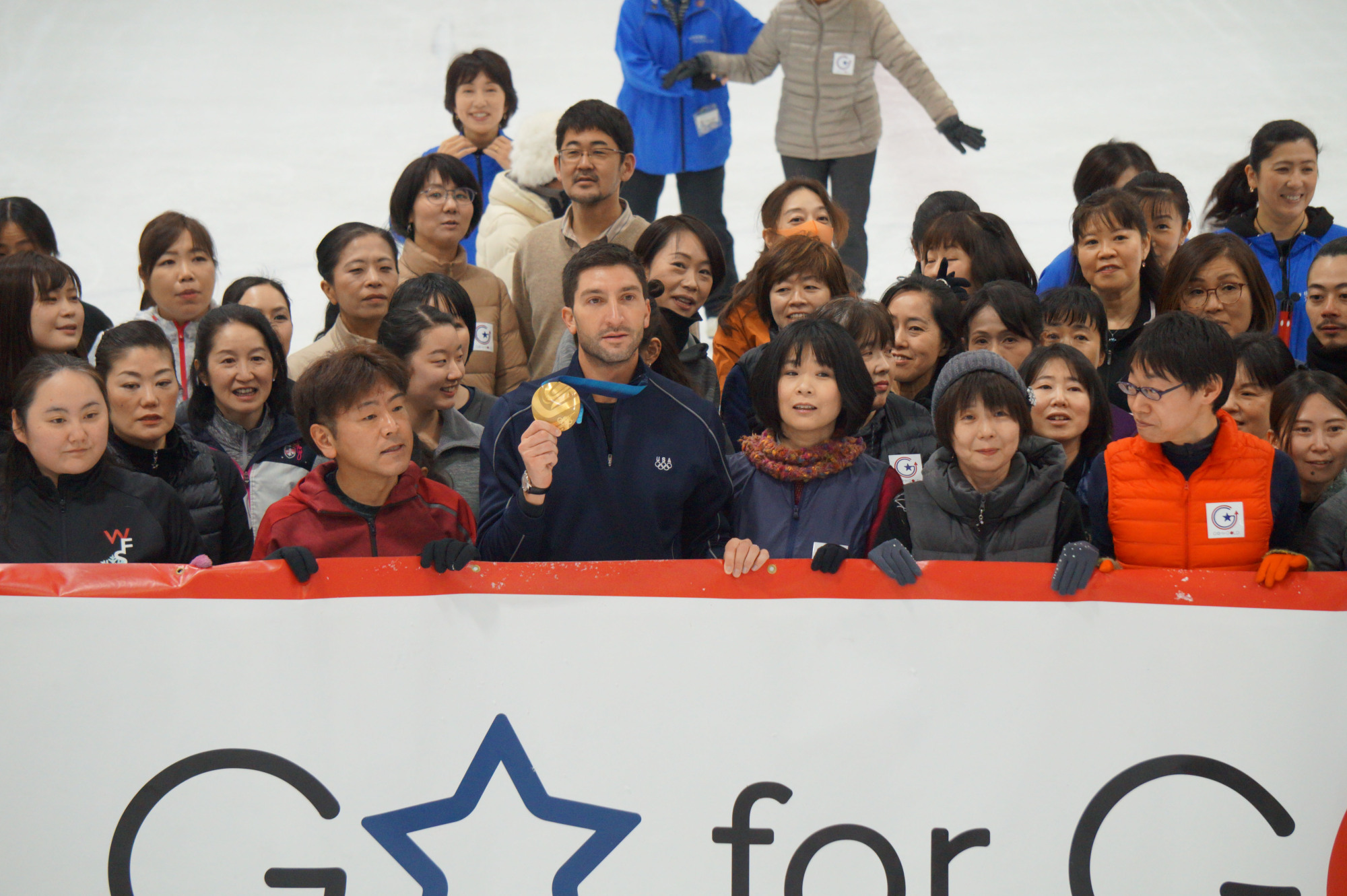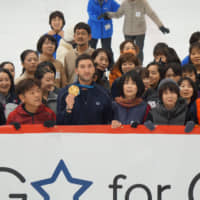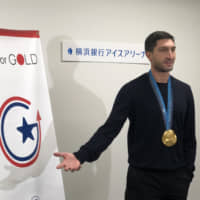Evan Lysacek glided across the ice so effortlessly you could forget he was doing it on a bum ankle.
Skating around Yokohama Bank Ice Arena during a skating clinic Thursday morning, Lysacek was doing simple movements, stuff you start out with when you get to the rink.
But even here, far closer to the ground floor than the penthouse of figure skating technique, it just looks different when an Olympic gold medalist, does it.
Of course, Lysacek spent a career speaking to the world through sublime movements on the ice, most famously at the 2010 Vancouver Olympics. He's still doing it, but on a smaller scale, such as at the clinic he ran Thursday as part of the U.S. Embassy's Go for Gold program.
"I think part of my message, in this role as a sports envoy, is being able to communicate through sports, with any group," he told The Japan Times.
"With these adults, with young kids, with people who have nothing to do with skating whatsoever, but are athletes, with students that may understand sports. Our common language is sports and it transcends differences in language and differences in culture."
Lysacek, 34, has been busy since arriving in Japan. Thursday's clinic was his fourth in the past week. After arriving in Tokyo, he went to Hanamaki, Iwate Prefecture, for a session with a group of fourth-graders. Then it was on to Osaka to visit with more advanced young skaters and then to Nagoya on Wednesday.
"It was cool for me to see the enthusiasm in Nagoya about skating, that's kind of the epicenter in Japan of skating," he said. "A lot of great champions have come from there."
From Japan in general over the years, including three-time world champion Mao Asada, a Nagoya native.
"It's amazing to see the incredible impact that Japan has had on figure skating, in a fairly short amount of time," he said. "They've been dominant, especially in singles in the ladies and men, for the last several generations, including mine.
"There's now, for this generation of kids that I saw yesterday and the day before, they have such an incredible history of role models that they can look up to, including Yuzuru Hanyu."
The crowd in Yokohama was a mix of young and old and eagerly followed Lysacek's every move and hung on every word.
"I really feel like they absorbed the on-ice skills that I was trying to teach," he said. "But also, I think they absorbed the message from what we were talking about a little bit and how that can help them if they continue skating, whatever skating will mean in their life, but it will also help them in everything that they do."
He likened figure skating to life, in that falling is a given, but that you also have the chance to learn from it and get up again. The star spoke about what being American meant to him and the connection he feels between the United States and Japan.
For fans in skating-mad Japan, it's hard to find a better way to spend a morning than with someone like Lysacek.
The Chicago native been skating when he was 8 and has won gold medals at the Grand Prix Final (2009-10 in Tokyo), the world championships (2009 in Los Angeles) and reached the pinnacle with his victory at the 2010 Vancouver Olympics almost 10 years ago to the day.
On his victory in Vancouver, Lysacek wondered how many remembered something that happened so long ago and admitted even he doesn't think of it the way he once did.
"If anyone does remember, really fans of skating or fans of mine, I just would hope they think of me as a skater or an athlete that represented my country well," Lysacek said. "I always took pride in that responsibility, to be a positive role model and a positive representative of the United States wherever in the world I was."
Lysacek has remained active in sports after skating, playing something nearly every day. "It drives my wife crazy," he said. "It's sort of like my need for endorphins."
Like many, he's looking forward to the Tokyo Olympics and didn't hesitate when asked which summer sport he'd enter if he could.
"I love tennis, I play tennis almost every day," he said. "There's no way I would ever, ever, ever win a medal, but I would love to compete in tennis."
He's also confident the relevant governing bodies will ensure a safe games amid ongoing fears about the recent coronavirus.
"I think the IOC will work with all Japanese authorities and the organizing committee here to make sure the situation is under control and secure by the time the Olympic Games come around," Lysacek said.



















With your current subscription plan you can comment on stories. However, before writing your first comment, please create a display name in the Profile section of your subscriber account page.